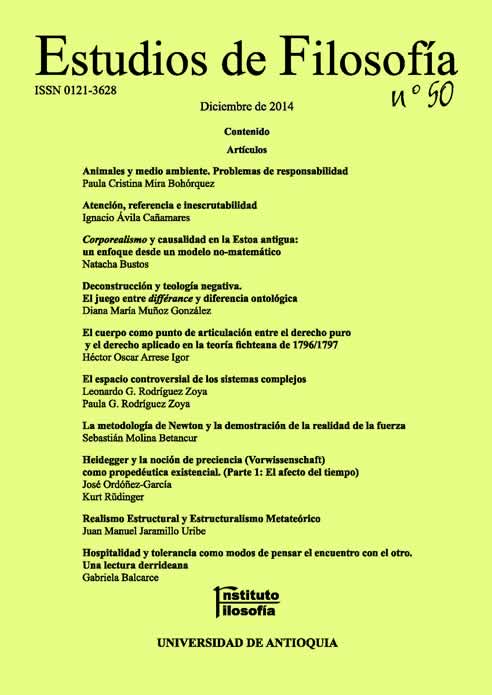Hospitality and tolerance as ways of seeing the encounter with the other. A Derridean reading
DOI:
https://doi.org/10.17533/udea.ef.21153Keywords:
hospitality, tolerance, othernessAbstract
This article attempts to trace the historical genealogy of Derrida’s notion of ‘hospitality’ the end of inquiry. It is for this reason that, at the beginning of our work, we will brie y address some features of ancient hospitality from the Odyssey, and then move to an analysis of the concept of tolerance in modernity, through three of its greatest defenders: John Locke, Voltaire, and John Stuart Mill. With these ideas in mind we then try to sketch the problem of hospitality from a Derridean perspective and from the influence of Emmanuel Levinas’ philosophy, in order to emphasize the importance of ethical and political thought of the other as other.
Downloads
References
DE PERETTI, C. (ed.) (2003) Espectrografías. Desde Marx y Derrida. Madrid: Trotta.
DERRIDA, J. (1998a) Adiós a Emmanuel Levinas seguido de Palabra de acogida. Madrid, Trotta. DOI: https://doi.org/10.1515/9781503617346
____________ (2005) Canallas. Dos ensayos sobre la razón. Trad. de Cristina De Peretti, Madrid, Trotta.
____________ (1997a) El monolingüismo del otro. Trad. de H. Pons, Buenos Aires, Manantial.
____________ (1997b) Fuerza de ley. Trad. de A. Barbera y P. Peñalver, Madrid, Tecnos.
____________ (2004) La filosofía en una época de terror. Diálogos con Jürgen Habermas y Jacques Derrida. Trad. de J. J. Botero y L.E. Hoyos, Buenos Aires, Taurus.
____________, Dufourmantelle, A. (2000) La hospitalidad. Trad. de M. Segoviano, Buenos Aires, De la Flor.
____________ (1989) La Escritura y la Diferencia. Trad. de P. Peñalver, Barcelona, Anthropos.
____________ (1999b) No escribo sin luz artificial. Trad. de R. Ibañez y M. J. Pozo, Valladolid, Cuatro.
____________ (1998b) Políticas de la Amistad seguido de El oído de Heidegger. Trad. de P. Peñalver. Madrid, Trotta.
____________ (1999a) “Sobre la hospitalidad”, en: Sur parole. Instantanés philosophiques. Paris, Éditions de l’Aube / France Culture.
GALERIUS AND CONSTANTINE (311/313) Edicts of Toleration. The Center for Medieval Studies, Medieval Sourcebook.
GRELL, O., Roy P.R, (ed.) (2000). Toleration in Enlightenment Europe. Cambridge, Cambridge University Press. DOI: https://doi.org/10.1017/CBO9780511628269
HABERMAS, J. (1989) El discurso filosófico de la modernidad. (Doce lecciones). Trad. de M. Jiménez Redondo, Madrid, Taurus.
____________ (1996) La inclusión del otro. Estudios de teoría política. Buenos Aires, Paidós.
HEIDEGGER, M. (1994) “Poéticamente habita el hombre”, en: Conferencias y Artículos. Trad. de Eustaquio Barjau, Barcelona, Serbal.
LEVINAS, E. (2001) Entre Nosotros. Ensayos para pensar en otro. Valencia, Pre-Textos.
____________ (1991) Ética e infinito. Madrid, Machado Libros.
____________ (1999) Totalidad e infinito. Ensayo sobre la exterioridad. Valencia,
Sígueme.
LOCKE, J. (2011) Ensayo sobre la tolerancia y otros escritos sobre ética y obediencia civil. Trad. de B. Rodríguez López y D.A. Fernández Peychaux, Madrid, Biblioteca Nueva.
MILL, J. S. (1977) Sobre la libertad. Buenos Aires, Aguilar.
NEUSNER, J. (ed.) (2008) Religious Tolerance in World Religions. West Conshohocken, PA, Templeton Foundation Press.
HOMERO (2004) Odisea. Trad.de Thomas Murau, La Plata, Terramar.
PENCHASZADEH, A. P. (2009) “Hospitalidad y soberanía. Reflexiones políticas: en torno de la filosofía de Jacques Derrida”, en: ISEGORÍA. Revista de Filosofía Moral y Política, No 40, enero-junio, pp. 177-190. DOI: https://doi.org/10.3989/isegoria.2009.i40.653
SCANLON, T. (2003) Difficulty of Tolerance. Cambridge, Cambridge University Press. DOI: https://doi.org/10.1017/CBO9780511615153
VOLTAIRE (1998) Tratado sobre la tolerancia. Trad. de L. Echavarri, Buenos Aires, Losada.
____________ (1950) “Diccionario de filosofía”, en: Obras escogidas, vol. 2, Buenos Aires, Prometeo.
WALZER, M. (1997) On Toleration. New Haven, Yale University Press.
Published
How to Cite
Issue
Section
Categories
License
Copyright (c) 2014 Gabriela Balcarce

This work is licensed under a Creative Commons Attribution-NonCommercial-ShareAlike 4.0 International License.
Authors who publish with this journal agree to the following terms:
1. The Author retains copyright in the Work, where the term "Work" shall include all digital objects that may result in subsequent electronic publication or distribution.
2. Upon acceptance of the Work, the author shall grant to the Publisher the right of first publication of the Work.
3. The Author shall grant to the Publisher a nonexclusive perpetual right and license to publish, archive, and make accessible the Work in whole or in part in all forms of media now or hereafter known under a Creative Commons Attribution-NoCommercia-ShareAlike (CC BY-NC-SA 4.0), or its equivalent, which, for the avoidance of doubt, allows others to copy, distribute, and transmit the Work under the following conditions: (a) Attribution: Other users must attribute the Work in the manner specified by the author as indicated on the journal Web site;(b) Noncommercial: Other users (including Publisher) may not use this Work for commercial purposes;
4. The Author is able to enter into separate, additional contractual arrangements for the nonexclusive distribution of the journal's published version of the Work (e.g., post it to an institutional repository or publish it in a book), as long as there is provided in the document an acknowledgement of its initial publication in this journal;
5. Authors are permitted, and Estudios de Filosofía promotes, to post online the preprint manuscript of the Work in institutional repositories or on their Websites prior to and during the submission process, as it can lead to productive exchanges, as well as earlier and greater citation of published work (see The Effect of Open Access). Any such posting made before acceptance and publication of the Work is expected be updated upon publication to include a reference to the Estudios de Filosofía's assigned URL to the Article and its final published version in Estudios de Filosofía.















